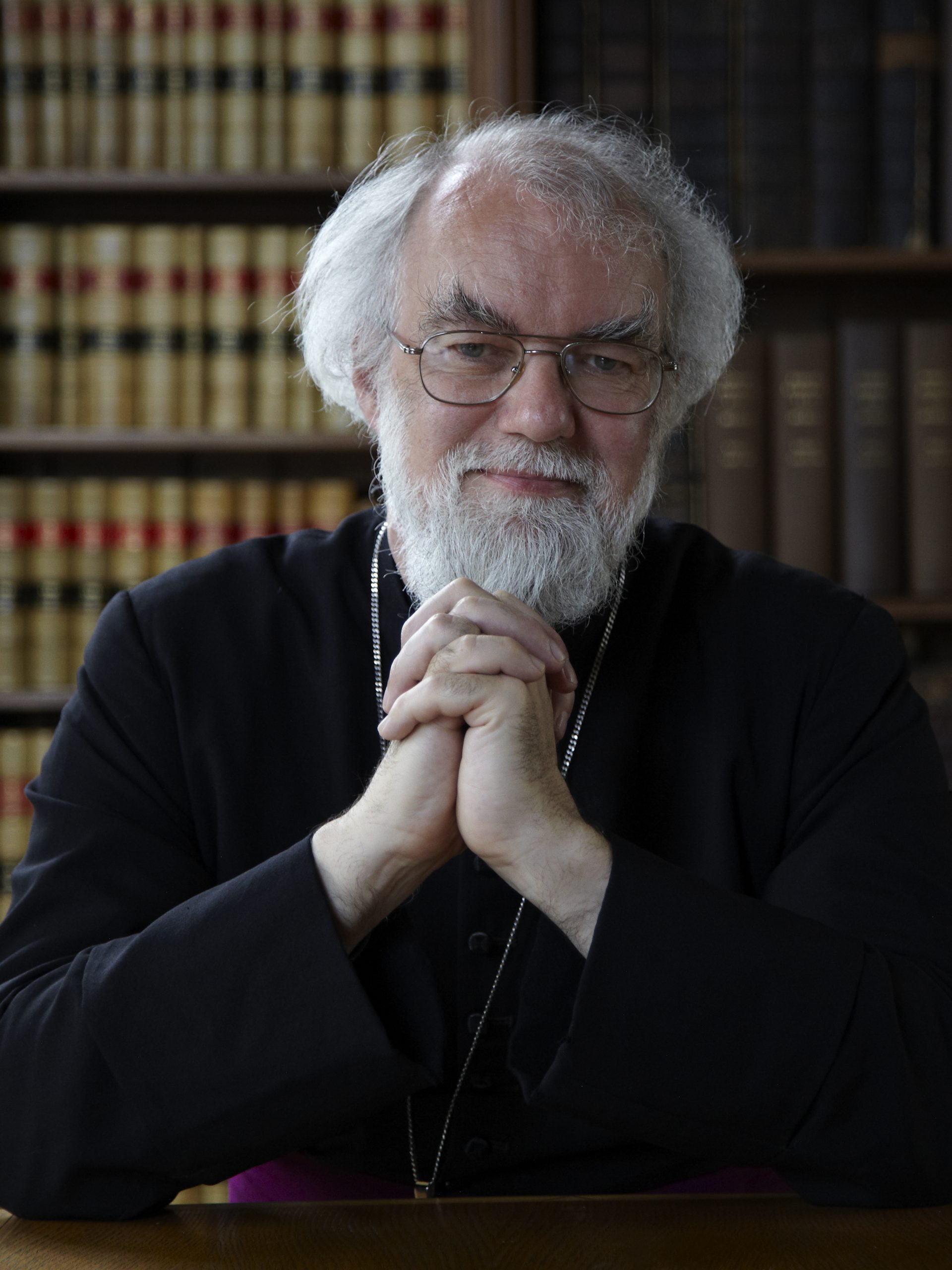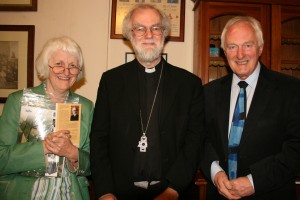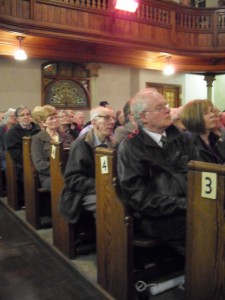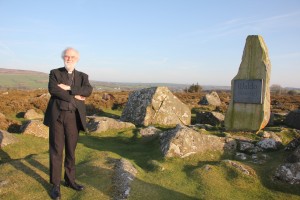
On Friday, March 23, 2012 the Archbishop of Canterbury, Rowan Williams, delivered a lecture entitled ‘Poetry and Peacemaking’, based on the poems of Waldo Williams, at Pisga Chapel, Llandysilio, Pembrokeshire. The event was organised by Cymdeithas Waldo and Waldo’s stature as a poet was enhanced to that of a poet who knew the true meaning of ‘awen’ or ‘life-force’.
Endeavouring to persuade the President of Zimbabwe, Robert Mugabe, in Harare, to respect human rights in his own country; endeavouring to enlighten Pope Benedict of the virtues of ecumenism by delivering a lecture in Rome entitled ‘Monastic Values and Ecumenical Hope’; endeavouring to convince the arch-atheist, Richard Dawkins, in a public debate at Oxford, that man must take heed of what is written in the Book of Genesis if he is to understand his role in the universe and informing whoever was prepared to listen that even terrorists such as the Taliban probably have their moral goals – those were some of the tasks the Archbishop of Canterbury set himself during the weeks prior to his visit to Llandysilio in Pembrokeshire.
His task at Pisga Chapel on Friday, 23 March 2012, was to emphasize the greatness of the local boy, Waldo Williams as a poet-pacifist on par with the American poet, Thomas Merton and the English poet, Geoffrey Hill. This he did with aplomb. He had a willing audience. Cerwyn Davies, in his formal greetings as the chairman of Cymdeithas Waldo, noted they both had two attributes in common namely their age and the fact they were both shepherds, albeit one who looked after the spiritual needs of 77 million Anglicans worldwide and the other who nurtured the needs of a few hundred sheep on the Preselau slopes. Archbishop Rowan Williams ascended to the Nonconformist pulpit adorned for 46 years by one of the leading lights of the Congregationalists, Rev Joseph James, who refined his speech impediment to the same accomplished degree as his Dowlais compatriot, the gifted historian, Gwyn Alf Williams. The foremost Anglican of his day appeared at ease as he set about to his task.

The audience soon realised they were listening to an exceptional soul deliberating upon another equally exceptional soul. The 61-year-old Welshman led us to the heights of the spiritual life by the means of those crucial words that appear time and time again in Waldo’s poems. Rowan Williams chose the poem ‘Mewn Dau Gae’ (In Two Fields) to illustrate his contention. He suggested that an understanding of the essence of the Welsh language was necessary to understand the true meaning of such a word as ‘awen’. The lecturer, a formidable poet in his own right, insisted that ‘awen’ does not translate meaningfully as ‘muse’.
The Archbishop explained that ‘awen’ is to do with the primitive primordial energy coupled with the imaginative spirit. He ventured further by stating that ‘awen’ owns the world whereas ‘elw’ (profit) is nothing but fantasy. This he insisted Waldo knew well and that, he emphasised, is why it is so important to understand the meaning of ‘awen’ as the quality that connects and completes all things under the surface. ‘Awen’ works by means of recognition and when this recognition is embodied in poetry the words possess the force of peacemaking. We were told that true poetry was in its essence an act of peacemaking as it is in itself an attempt at reconciliation at a level above all political agenda. He insisted this was part of Waldo’s perceived wisdom.

The respected theologian referred to how being a Quaker had influenced Waldo’s inner life by forcing him to concentrate on the light that offers an instinctive path towards the truth through the emphasis placed on listening to silence and listening to wonder. He convinced us that Waldo was an old hand at waiting for the silence. He referred to Euros Bowen and Steffan Griffith’s understanding of how Waldo reached the depths of silence and how he fervently opposed the sound of words in the Friends’ meetings as it hindered the process of planting the roots of silence. Rowan Williams emphasised how poetry resists cliché and banal rhymes as the true poet wishes to demonstrate the integrity of words through simplicity of expression. Poetry is an art keen to reconcile and that is why Waldo opposed the greed that creates profit and the tearing of the earth by military vehicles, as he believed the seeds of God should be sown in the earth. He said that Waldo by articulating his experience in Flour Field and Flour Field Marsh, as he does in the poem ‘In Two Fields’, testifies to the transforming force of ‘awen’.
He referred to Waldo’s own description of being present at the baptism of a young man who was on his way to war and how he wished the young man’s allegiance to the state could be transformed to an allegiance to ‘awen’ which possesses hidden depths capable of changing the world. The audience was spellbound as the Bishop of St David’s, J. Wyn Evans gave a vote of thanks from the pulpit. Neither would he – nor the Archbishop – have been allowed anywhere near the Set Fawr let alone the pulpit fifty years ago when one of his predecessors, Bishop J. R. Richards issued an edict forbidding vicars and ministers from taking part, in any form, in each other’s services. However, fraternity is now to the fore as all and sundry realised that the voice of a poet-peacemaker would be able to regain conciliation in many parts of today’s world if only the politicians and generals would listen to the silence.

Archbishop Rowan was then led to the Vestry where he met a large majority of the audience who had filled the chapel to the brim; in their midst many who had travelled specifically for the occasion from all parts of Wales including Llandudno, Caernarfon, Cardiff, Llanelli, Swansea and Aberystwyth to witness the testimony of an enlightened man who recently announced his intention to return to academia at Magdalene College, Cambridge following ten years in his present role. Vernon Beynon presented the Archbishop with two cuttings of wood from Flour Field and Flour Field Moor as a symbol of where Waldo felt a mystical religious experience as a teenager, which then, forty years later, evolved into the poem ‘In Two Fields’. Before leaving Llandysilio Rowan Williams shook hands with Waldo’s nephews and described such an act as a privilege. He left leaving his humility and an appreciation anew of Waldo Williams’s greatness.
